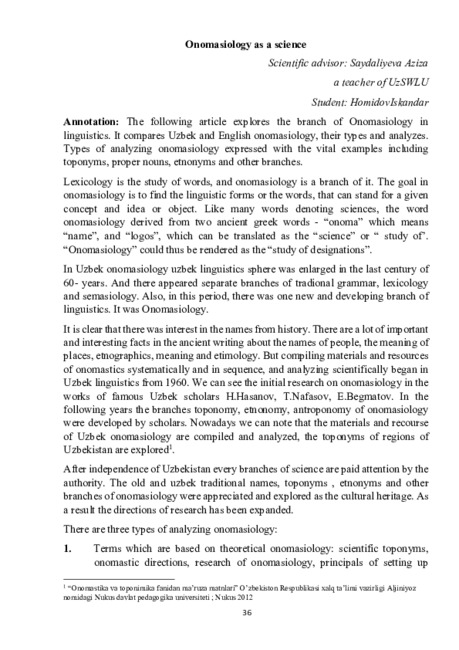
36
Onomasiology as a science
Scientific advisor: Saydaliyeva Aziza
a teacher of UzSWLU
Student: HomidovIskandar
Annotation:
The following article explores the branch of Onomasiology in
linguistics. It compares Uzbek and English onomasiology, their types and analyzes.
Types of analyzing onomasiology expressed with the vital examples including
toponyms, proper nouns, etnonyms and other branches.
Lexicology is the study of words, and onomasiology is a branch of it. The goal in
onomasiology is to find the linguistic forms or the words, that can stand for a given
concept and idea or object. Like many words denoting sciences, the word
onomasiology derived from two ancient greek words - “onoma” which means
“name”, and “logos”, which can be translated as the “science” or “ study of’.
“Onomasiology” could thus be rendered as the “study of designations”.
In Uzbek onomasiology uzbek linguistics sphere was enlarged in the last century of
60- years. And there appeared separate branches of tradional grammar, lexicology
and semasiology. Also, in this period, there was one new and developing branch of
linguistics. It was Onomasiology.
It is clear that there was interest in the names from history. There are a lot of important
and interesting facts in the ancient writing about the names of people, the meaning of
places, etnographics, meaning and etimology. But compiling materials and resources
of onomastics systematically and in sequence, and analyzing scientifically began in
Uzbek linguistics from 1960. We can see the initial research on onomasiology in the
works of famous Uzbek scholars H.Hasanov, T.Nafasov, E.Begmatov. In the
following years the branches toponomy, etnonomy, antroponomy of onomasiology
were developed by scholars. Nowadays we can note that the materials and recourse
of Uzbek onomasiology are compiled and analyzed, the toponyms of regions of
Uzbekistan are explored
1
.
After independence of Uzbekistan every branches of science are paid attention by the
authority. The old and uzbek traditional names, toponyms , etnonyms and other
branches of onomasiology were appreciated and explored as the cultural heritage. As
a result the directions of research has been expanded.
There are three types of analyzing onomasiology:
1.
Terms which are based on theoretical onomasiology: scientific toponyms,
onomastic directions, research of onomasiology, principals of setting up
1
“Onomastika va toponimika fanidan ma’ruza matnlari” O’zbekiston Respublikasi xalq ta’limi vazirligi Aljiniyoz
nomidagi Nukus davlat pedagogika universiteti ; Nukus 2012

37
ancient names, ancient -etymologic directions, methodology of toponyms,
general toponyms.
2.
Scientific directions of proper nouns: names of etnographs, onomastic
lexicography, toponymic atlas, toponym of lexicography, to research
toponyms, research of toponyms historically, historical- etymologic
dictionary of toponyms, etymologic dictionary of toponyms, etymologic
research of toponyms.
3.
Methods of scientific research:
toponymic classification //onomastic
definition, toponymic classification // toponiymic definition, to identify
toponymic layer, chronogical type, extralinguistic classification.
English belongs to the group of Germanic languages. English goes back to the same
proto-language that is also the “mother” of Dutch, Low German, High German,
Norwegian, Danish, Swedish, Icelandic. The group of Germanic languages, in turn,
belongs to the Indo-European language family, like the Romanic languages and their
“mother” Latin, the Celtic languages, the Balto-Slavic languages and others. Every
word has a history, every word has an origin, every word has a motivated origin -
even if the origin might no longer be transparent due to phonetic changes.
The concept of Naming Unit plays an important role in linguistic theories and is
crucial for a functional , onomasiological approach to language and for the empirical
study of word-formation , for semantics and pragmatics . The most famous scholars
who investigated on this Naming unit are considered Mathesius , Stekaur , Grzega
and others
2
.
In English language onomasiology was already initiated in the late 19
th
century, but
it did not receive its names until 1902, when the Austrian linguist Adolf Zauner
published his study div-part terminology in Romance languages. And it is in
Romance linguistics that the most important onomasiological works were written.
But after that, it was introduced into linguistics by Vilem Mathesius in 1961.
However his ideas were only published in English in 1975 in a book edited by
J.Vachek, translated by L.Duskova, under the title “
A functioned analysis of present
day English”.
Onomasiology can also be help in other fields of the educational system. Due to
knowledge of phonetic and sematic changes , it can acquiring English words more
easy to learners with mother tongues related to English. They are able to show
students that the change of designations does not change the thing. This can be
relevant in understanding sociopolitical rhetorics and marketing language.
Further historical onomasiology can help to warn of historically insensitive
4
LIPKA Leonhard.2002, Names, onomasiology and semantics. In S.Scholz, Munchen: Langenscheidet-Longman, pp
217

38
neologisms. On the other hand, historical onomasiology can illustrate that
interpreting a word only in its historical sense might equally well lead to an
historically insensitive view.
References:
1.
Joachim Grzega and Marion Schoner English and general historical
lexicology. Katcholic University, Germany, July 2007.
2.
LIPKA Leonhard.2002, Names, onomasiology and semantics. In S.Scholz,
Munchen: Langenscheidet-Longman, pp 217.
3.
“Onomastika va toponimika fanidan ma’ruza matnlari” O’zbekiston
Respublikasi xalq ta’limi vazirligi Aljiniyoz nomidagi Nukus davlat
pedagogika universiteti, Nukus 2012.
4.
Paluanova, X. D. Derivation-semantic principles of ecological terms in
English, Uzbek, Russian and Karakalpak languages. DSc. Diss.
dissertation. Tashkent, 2016.
5.
Paluanova, H. "Reading comprehension and its development in teaching
foreign languages." Психология и педагогика: методика и проблемы
практического применения 50-2 (2016): 67-71.






